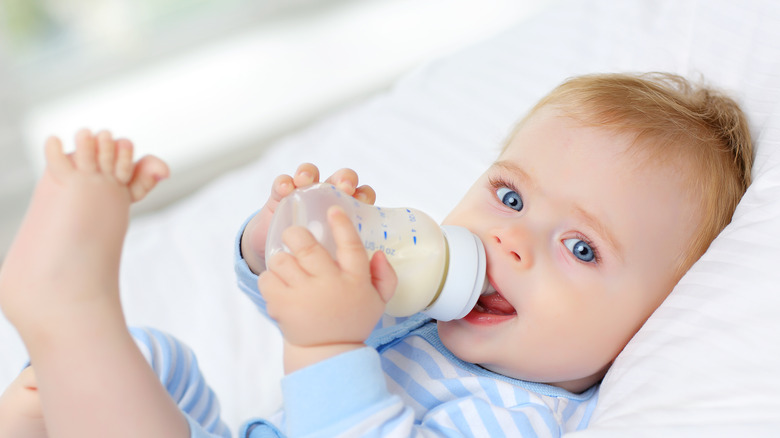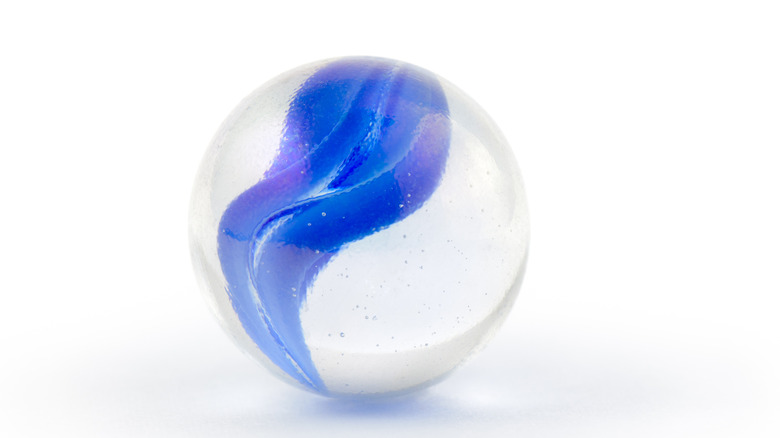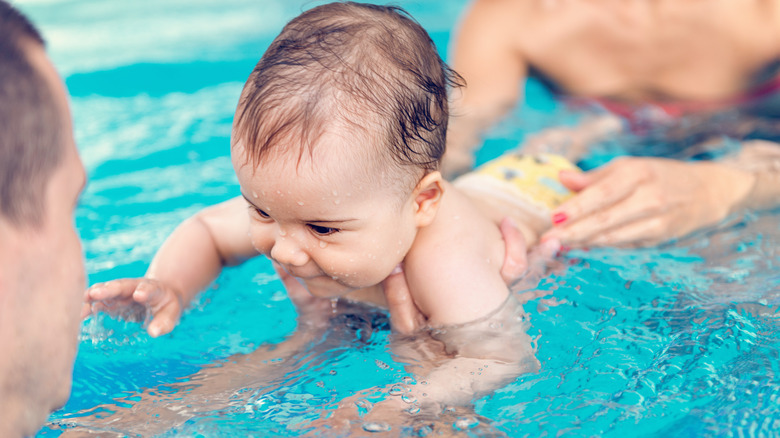The Surprising Reason You Shouldn't Give Water To Your Baby
You know what it's like to be thirsty, hot, and dehydrated on a summer day. When you feel like that, chances are you reach for a nice cold bottle of water. It may have crossed your mind if your baby might benefit from a drink of cold water too. After all, she's feeling the heat as well. But what you should do instead is offer her a bottle or a breast. Even though it's warm, and honestly not too appealing to a thirsty adult, formula or breast milk will hit the spot for your baby.
Water is actually not recommended for small babies at all for at least four months — preferably six — for some very important reasons. It can interfere with their essential nutritional intake and, in some instances, can even be toxic. Here are the details about why you should hold off on giving your infant water, when it's safe to do so, and how to get her to love drinking water when the time is right.
Babies have tiny tummies
At birth, a newborn's stomach is the size of just a marble and can hold only one to two teaspoons of fluid, according to the USDA's WIC Breastfeeding Support page. And it drains pretty quickly too. For breast-fed babies, one study showed that half of a feeding had emptied in 48 minutes. Because her belly holds so little, she has to be fed frequently in those early days and weeks. Her stomach will gradually grow in size and begin to stretch over the next six months, at which time her belly will be able to hold about seven ounces (per Healthline). Until that point, the content of those ounces is critical. Formula and breast milk provide your baby with all the quality nutrients she needs to grow and develop, while water provides none. And since her tummy is so tiny, even a small amount of water can interfere with hunger and prevent her from taking enough formula or breast milk.
It's best, therefore, to avoid giving your baby water in the first six months of life. It has no nutritional value, and the benefit of keeping her hydrated is better accomplished by providing her with formula or breast milk instead.
How water can be toxic to babies
It may not make sense that something as natural as water can be toxic, but in excess it can be, for babies and adults, and everyone in between. "Water intoxication" occurs when too much is consumed over a short period of time, according to Healthline. This overwhelms the kidneys so they cannot process the large amount of water. Excess water then winds up in the bloodstream, diluting the concentration of sodium. This can lead to hyponatremia, or too-low levels of salt in the blood, which in turn can cause brain swelling or even death.
For babies, their kidneys become overwhelmed with a much lower amount of water because not only are they smaller in size, but they're also still immature. Even what seems like a moderate amount of water to an adult can cause a baby to develop hyponatremia and possibly brain swelling. The only safe course when it comes to a baby and water is not to give it at all.
A less obvious way that a baby might ingest water is accidentally in a pool. Some swimming schools begin teaching infants how to swim at four months of age. Without proper supervision, a baby can swallow pool water and be at risk for developing water intoxication.
If you feed your baby powdered or concentrated formula, don't mix in more than the correct amount of water. Diluting formula (or breast milk) not only lowers the concentration of nutrients in the formula, but it can also lead to water intoxication (per The Bump).
The right time to introduce water
A rule of thumb is, you can give your baby water when you start introducing her to solids — generally at six months, according to The Bump. As you do with solids, the introduction of water should be on a small scale initially, such as a teaspoon or tablespoon at a time, recommends Healthline. You can use whatever makes sense for you and your baby: a few sips from a cup, a small amount from a bottle, or letting her suck a bit from a straw.
The immediate goal is not hydration but getting her used to the taste of water — or lack thereof. She may make a scrunched-up face when first tasting it. After all, she's used to the flavor of formula or breast milk. That's fine. Even up to the age of nine to twelve months old, your baby doesn't need water. She should still get her hydration, and most of her nutrition, from breast milk or formula. The aim is to ready her for drinking water regularly. "It's one of the healthiest habits to start early," Tanya Altmann, M.D., a pediatrician in California and author of What To Feed Your Baby, told The Bump.
When your baby is a year old and officially a toddler, she should have a few ounces of water a day, given to her between meals. Drinking water is not only healthy in and of itself, but it can substitute for juices, which can be high in sugar and low in nutrition. Cheers to water!




